The Story Behind Pharrell’s Surprise New Louis Vuitton Collaboration With Mumford & Sons
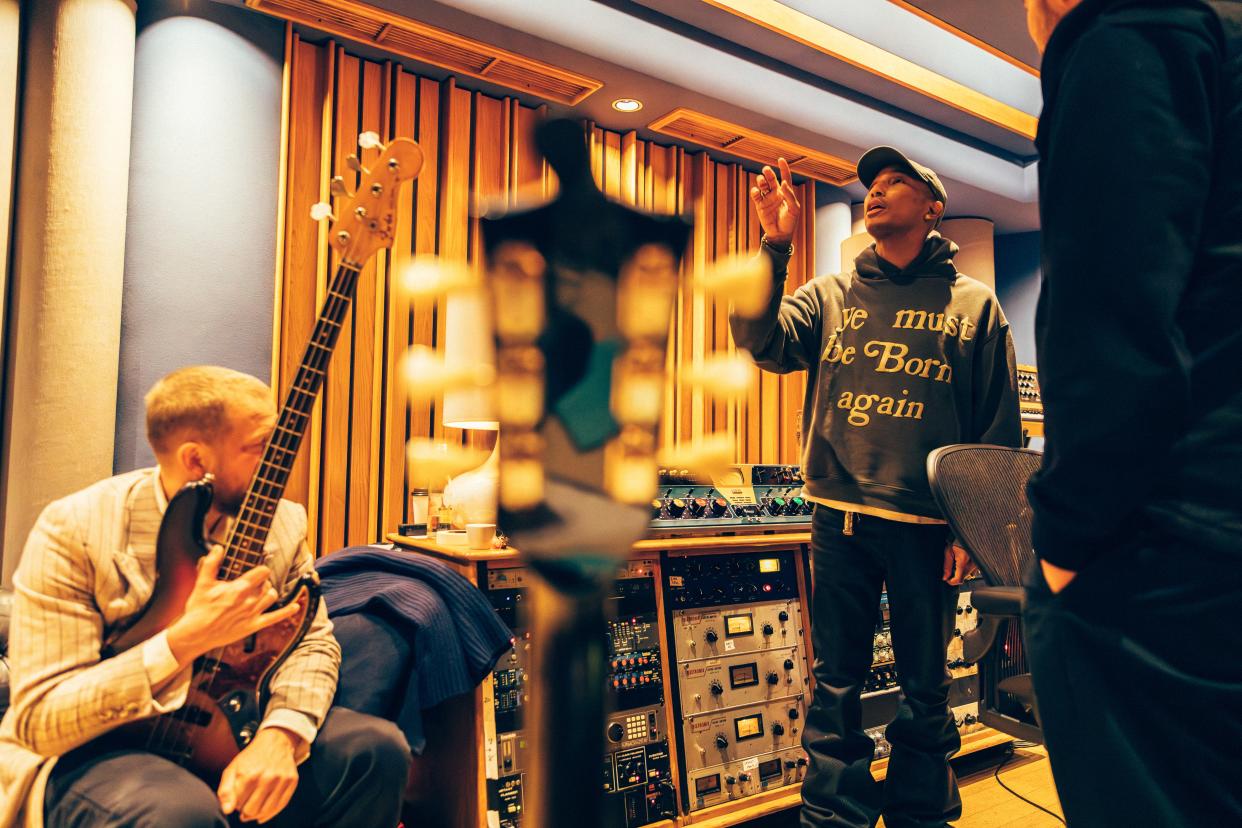
- Oops!Something went wrong.Please try again later.
- Oops!Something went wrong.Please try again later.
- Oops!Something went wrong.Please try again later.
Driely Carter
Before Tuesday night’s Louis Vuitton men’s show in Paris, if you had taken bets from the crowd on the night’s surprise musical performer, I’m not sure any of the 1,300 guests would have gotten the answer right. All week long, Pharrell Williams had been teasing cowboy themes on his semi-official Finsta, so there were hints about what was on his mind this season. Country music, perhaps? Close, but not quite. Few would have guessed that British trio Mumford & Sons would be laying down the rhythm at Pharrell’s third show for the French luxury flagship house.
Including the band themselves.
“Yeah, it’s a first,” Marcus Mumford told me. Mumford, the frontman who founded the band with a few mates back in 2007, was grinning from ear to ear on a shaky Zoom feed from a studio in Paris, where he and bandmates Ben Lovett and Ted Dwane had just rehearsed the song “Good People” for the first time, which they wrote and recorded with Pharrell in studios in New York and Paris. “It turns out it’s fucking high,” Mumford said. “So I'm having to really stretch singing-wise. But, no, it's going to be fun.”
“Good People,” featured in the show soundtrack and a live Mumford & Sons after-show performance, marks the first new music the singer-songwriters have released in five years. They didn’t plan for the occasion to be at their first Paris Fashion Week appearance ever, much less at the biggest show of the week or even in collaboration with Pharrell. But, as they discovered, collaborating with the producer and designer is to get picked up by a creative whirlwind that can touch down in unexpected places. “We have,” as Mumford said, “entered into the spontaneous world of Pharrell Williams.”
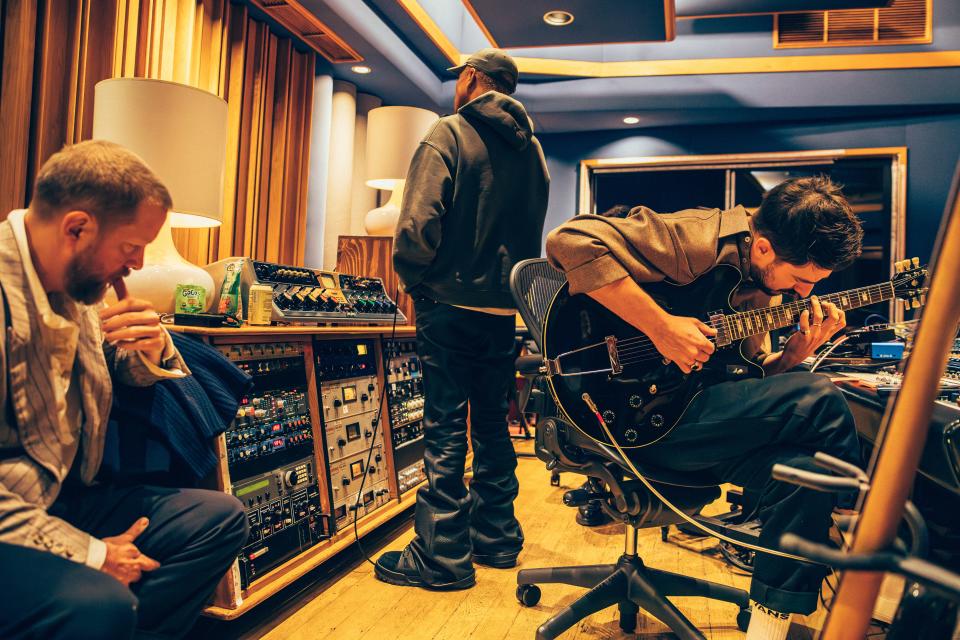
And now they’re part of an broader project that’s just now coming into focus, one where Pharrell is fusing his worlds of music and fashion in a novel and exciting way. Fashion show soundtracks are a funny thing. As Mark Ronson—who is sort of like the Pharrell of runway scores—told me last week in Milan, “When you do the music for shows, usually you put all this work into something that lives and dies on the day.” But Pharrell is using his runway shows to promote and drop new music, singles that are instantly played by the millions of people around who tune in to the productions. “Good People” follows the live debut of “Joy (Unspeakable),” a collaboration between the hitmaker and gospel choir Voices of Fire, at his first Paris show in June, and the release of the deeply catchy single “Airplane Tickets” with Swae Lee and Rauw Alejandro at his pre-fall 2024 show in Hong Kong in November.
If there was any question about whether Pharrell’s prolific music career would take a backseat in his LV era, it now looks like his new job has actually positioned him to create even more music than before.
Pharrell and Mumford & Sons first connected over a decade ago on the festival circuit. “There was just a lot of mutual respect and admiration,” recalls Mumford, who would go on to perform “Happy” with Pharrell at a benefit concert in 2017. “I've been on stage with a lot of charismatic performers, but he wipes the floor with any of them, man,” he said. As Mumford recalls, they began talking about working together from practically day one. “Trying to make an acoustic dance record together, or something.”
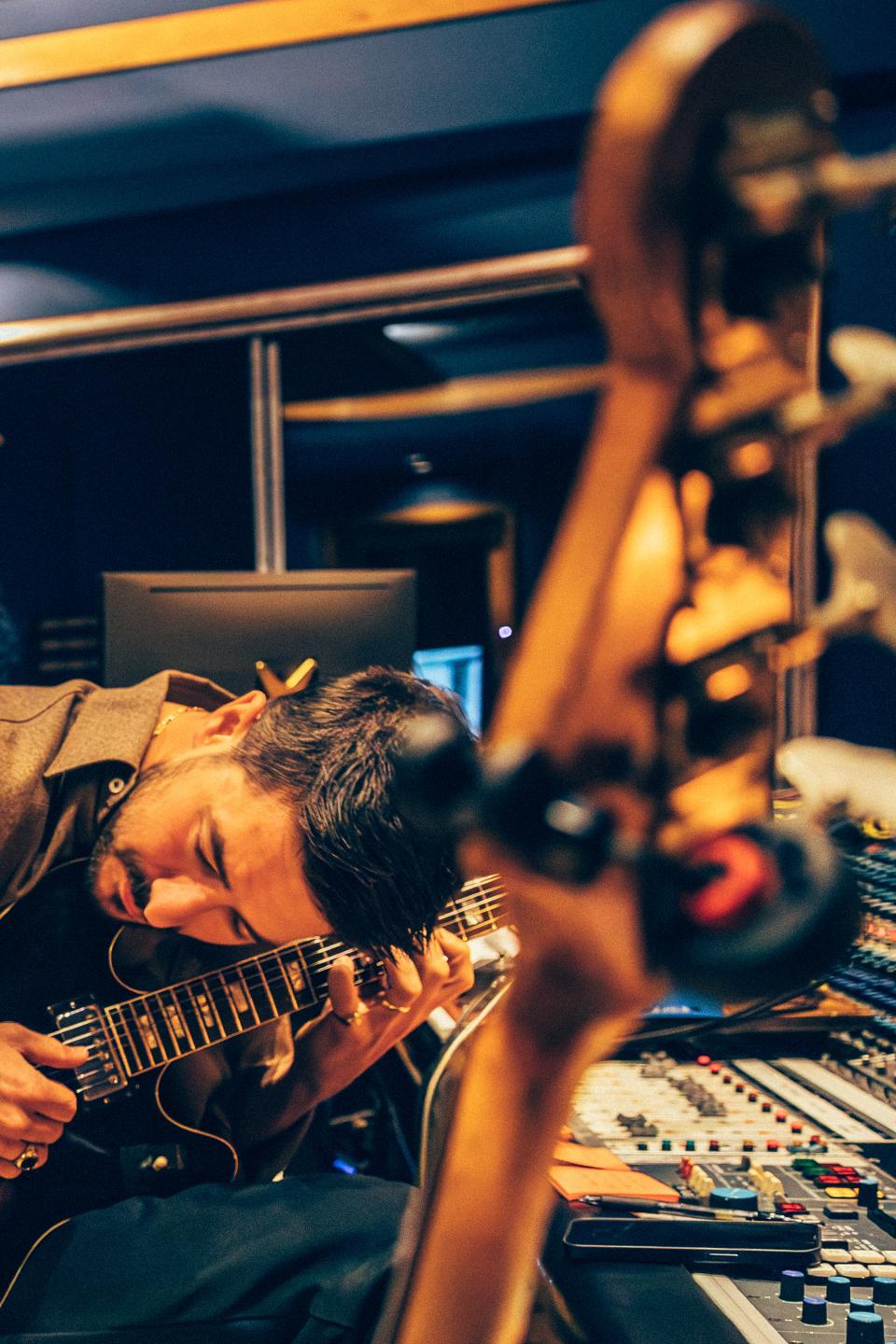
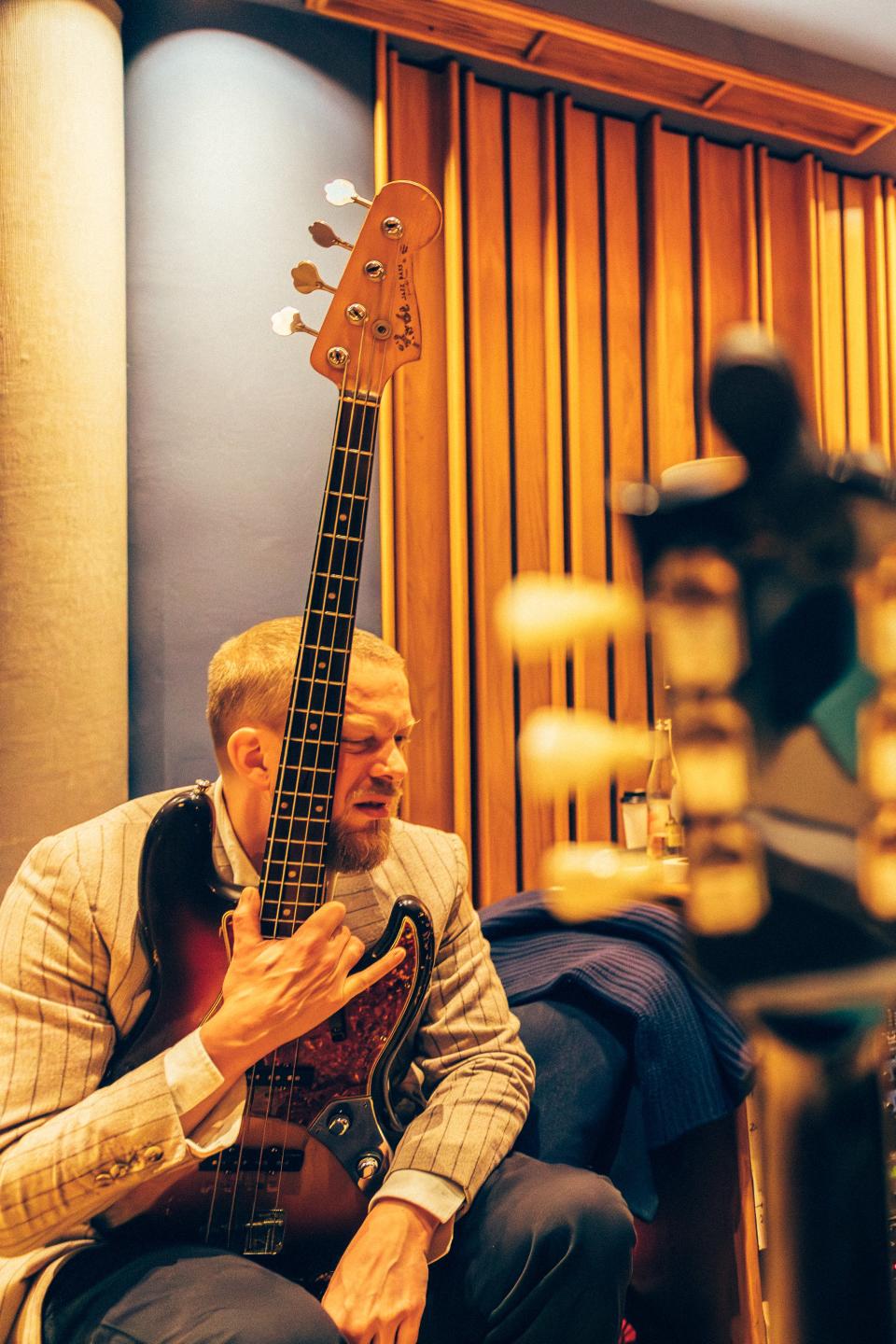
Reached via an interlocutor on the morning of the show, I asked Pharrell why he wanted to get in the studio with Mumford & Sons. (Recall that at the time the anthemic band was one of the most popular in the world, but known as folksy and intensely earnest and had a banjo player. So, not exactly cool by a standard Pharrell might use.) In a voice memo, Pharrell explained: “I always thought that their sound was an interesting one and the aesthetic was just as interesting. And I was very curious as to what it would be like to work with them, there was like a snowball effect of curiosity, and if I could even be of added value.”
It turns out he could. The band finally reconnected with Pharrell in April at Something In the Water, his music festival in Virginia. “I said to him,” recalled Mumford, ‘We've got to get together and finally make it happen.’ He said, ‘I'm waiting on you.’” Mumford laughed about the acoustic dance record that could have been. “Turns out he's been waiting for us. Yeah, I was like, ‘I thought you were fucking busy, mate.’”
They got together in a studio in New York in November, and again in Paris in December. Pharrell is indeed a busy man, but the band was struck by how locked in he was in the studio. “What's amazing about him is that when he's in the room, he's completely focused on the thing he's doing, which I think is how he manages to do lots,” Mumford said. The problem was that, going into the studio sessions in Paris, Mumford found himself in a months-long writer’s block, and he confided as much to Pharrell. Luckily, he was talking to someone who had probably dreamed up a hit song and three pairs of shoes that morning. “He was like, ‘That's bullshit. You haven't stopped feeling, you just don't know how to express how you feel. I don't believe in you being blocked.’”
Their breakthrough came in conversations about their upbringings in the church, their shared roots of gospel music and hymnals. “We talked about how change doesn't come without a revelation first,” Mumford said. “And we both had experience with that. We'd all had experience with that, and it felt like we were ready to write a song that felt quite connected to how we were feeling and reaching into some soulful level.”
“Good People” is a chanting gospel song, a good-old Mumford ballad constructed on an even bigger, Pharrell-sized scale. “I think we've been really keen to represent an urgency and a confidence that we found throughout the course of last year,” said Dwane. Once Pharrell brought them the rhythm, it only took about eight hours to finish it off. This is a bit of a faster timeline than they’re used to. “It’s so different to the songwriter world where you rehearse for six months before you even go into record a song,” said Mumford. Pharrell’s process—and packed schedule—encourages rapid decision-making. According to the band, the crazed pace ended up making all the difference, unlocking new ideas they would have otherwise ignored. “This is reaction in real time and things move fast,” Mumford said. “But I think that kind of helps breed creativity and a belief in the studio, which is really helpful and confidence building where you're like—this gut reaction and this instinct is good, let's follow it.”
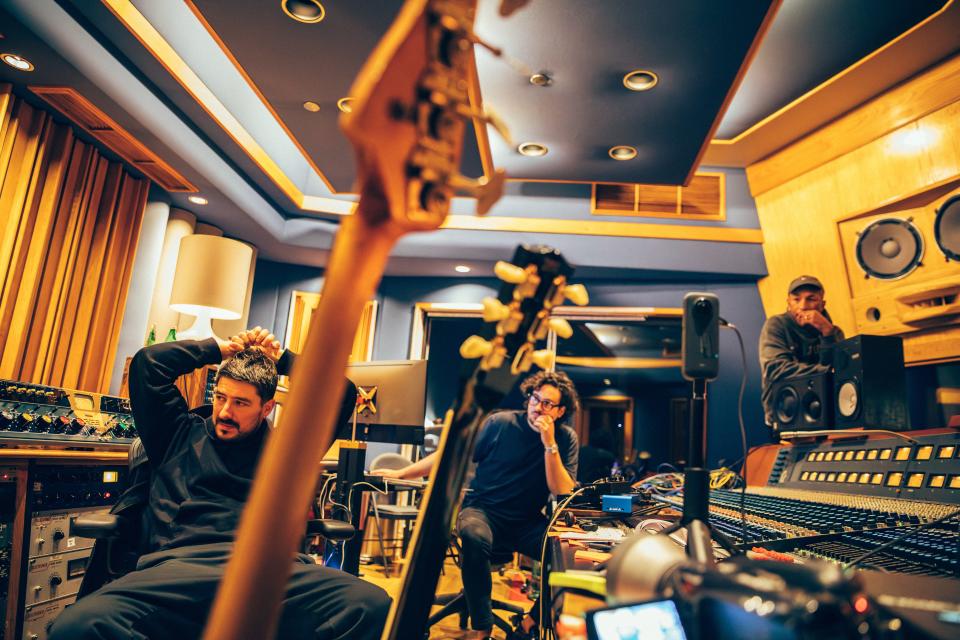
On Zoom, I ask about the not-so-subtle irony of the track’s heavy, biblical lyrics in the context of a massive luxury fashion spectacle. Like, “The first shall be last and the last shall be first,” and the backing lyrics “Welcome to the revelation,” sung by Pharrell and the Native Vocalists, a six-piece choir from native American tribes. I note that’s two letters away from a major call to action. The band chuckled. In a way, Lovett pointed out, Pharrell embodies all of the contradictions of the fashion system they’re now a part of, this hyper-exclusive but also hyper-popular world. “Pharrell, he's both super premium and luxury, but he's super grounded simultaneously and inclusive, and he opens up as if you were childhood friends and then he'll go and come out of a Cybertruck the next day,” said Lovett. “He just has this ability to straddle the worlds that we live in.”
For his part, Pharrell told me on the voice memo that the creative exchange has been mutual. “As it turns out, it’s been amazing to work with them, and I'm learning so much.”
And how did he decide that the song he had just made with Mumford & Sons should in fact be part of his LV project? It was not made for the show, but he felt it should be a part of it, even if it sounds much different than the music he’s best known for. Why? “That’s my job,” he replied. “To excavate difference.”
Originally Appeared on GQ

